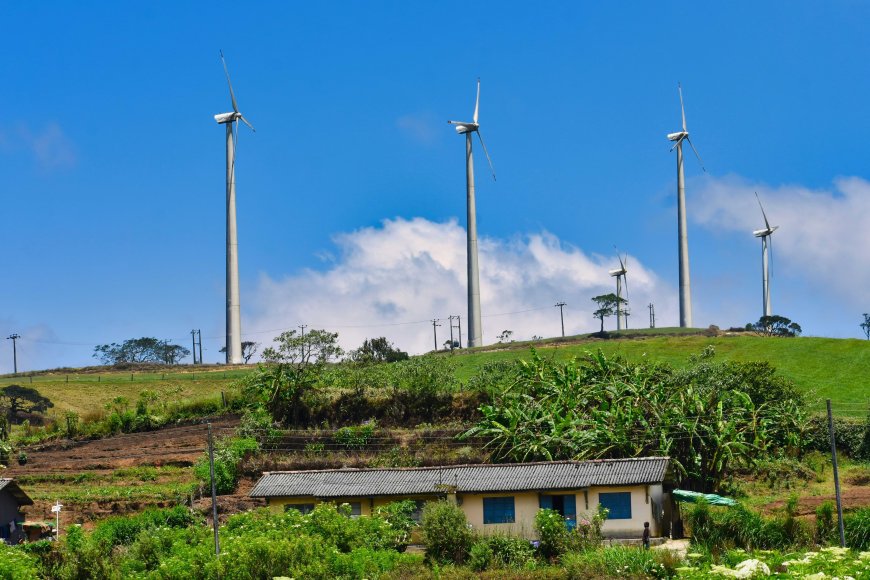BY GIDEON ADJEI-MAWUTOR
Ghana is on the frontline of climate change, facing extreme weather conditions that are reshaping daily life and prospects. Predictions point to an overall 2.9°C temperature increase in sub-Saharan Africa by 2030, with projections of up to 140 extremely hot days annually by the 2060s. West African communities, especially, are the most impacted by the effects of the climate crisis, but they are among the smallest contributors to global greenhouse gas emissions.
In Ghana, the situation is dire, from droughts to floods, disease to hunger, the impact of climate change has exacerbated human suffering, displacement, violence, and economic collapse. To mitigate the effects of climate change, Ghana must adopt climate-smart agriculture, resilient cities, renewable energy, and sustainable forest management, while leveraging education, research, and public-private partnerships to drive these solutions.
Africa has seen a steady rise in temperatures over the last 30 to 40 years. Rising global temperatures will make West Africa, Ghana included, dangerously hot. Such conditions increase the risks of chronic illnesses, heat-related injuries, and declining labour productivity. For example, manual labour capacity in Ghana could fall by 11 percent with a 3°C rise in average temperatures. The climate crisis also disrupts rainfall, producing cycles of droughts and floods. Every year, an estimated 45,000 Ghanaians are affected by floods, while droughts impact about 13 percent of the population. Cowater International estimated that in 2020, droughts caused direct economic losses of 95 million dollars, with future projections suggesting losses could exceed 325 million dollars annually by 2050.
Advertisement
Additionally, in agriculture, smallholder farmers are highly vulnerable to erratic rainfall, pests, and declining soil fertility. Cocoa, the nation’s top export and lifeline for 800,000 farm families, is under threat from rising sea levels, floods, and coastal erosion. Fishing and livestock are also at risk, with climate change projected to cut fish catch potential by 26 percent or more by 2050. The human impacts are also severe. Food insecurity already affects 3.6 million Ghanaians, and climate shocks will push at least one million more into poverty by 2050. Resource scarcity intensifies farmer-herder conflicts, while rising displacement could make Ghana part of the projected 32 million internal climate migrants in West Africa by mid-century.
Ghana can reduce the risks of climate change by supporting farmers and vulnerable communities. This support means promoting climate-smart agriculture, investing in drought-resistant crops, and improving irrigation systems. Education campaigns can help families understand and adapt to new realities, while programs that target women, youth, and coastal populations can build resilience against floods, erosion, and forced migration. Stronger partnerships with schools, local groups, and traditional leaders can ensure climate awareness becomes part of community life, equipping the next generation to manage risks and take advantage of new opportunities.
Rwanda, for instance, has introduced Terracing and Land Husbandry programs that improve soil health, reduce erosion, and boost crop yields. These initiatives have combined farmer training with sustainable land management, directly improving food security and resilience to droughts.
Advertisement
The government must ensure that urban areas are sustainable and better equipped to cope with extreme weather. Doing this requires stronger city planning, improved flood defenses, and smarter waste management. Public-private partnerships can provide funding for resilient transport and mobility systems that keep supply chains running during crises. Ghana also needs stronger early warning systems and better financial planning to respond to floods, droughts, and health emergencies.
Social protection programs, combined with public education and locally driven research, can shield the most vulnerable households from falling deeper into poverty when climate shocks strike. Ethiopia’s Green Legacy Initiative has planted more than 25 billion trees since 2019, aiming to fight deforestation, restore degraded lands, and create jobs.
Furthermore, a just transition for Ghana must prioritize renewable energy, sustainable forestry, and modern transportation. Scaling up solar, wind, and hydropower will expand affordable access and create new jobs. Protecting and restoring forests can provide natural shields against climate change while supporting livelihoods, particularly through cleaner cooking solutions that reduce reliance on charcoal. Investment in public transport and improved vehicle standards will reduce emissions and strengthen energy security.
By encouraging innovation through research and partnerships, Ghana can create a greener economy while protecting people and communities most at risk. For example, Kenya now generates over 80 percent of its electricity from renewables, mainly geothermal, wind, and solar. Projects like the Lake Turkana Wind Power Project have shown how public-private partnerships can scale clean energy while creating jobs and improving energy access.
Advertisement
If Ghana dares to lead with courage and innovation, it can turn the climate crisis into a chance to build a greener, fairer future. Ghana has the power to turn frontline struggles into frontline solutions. The decisions made today can shape Ghana’s future and its citizens, while leading as a model for Africa’s green transition.
Gideon Adjei-Mawutor is a development practitioner and youth & gender advocate. He is on X (Twitter): @Giddijei
Views expressed by contributors are strictly personal and not of TheCable.
